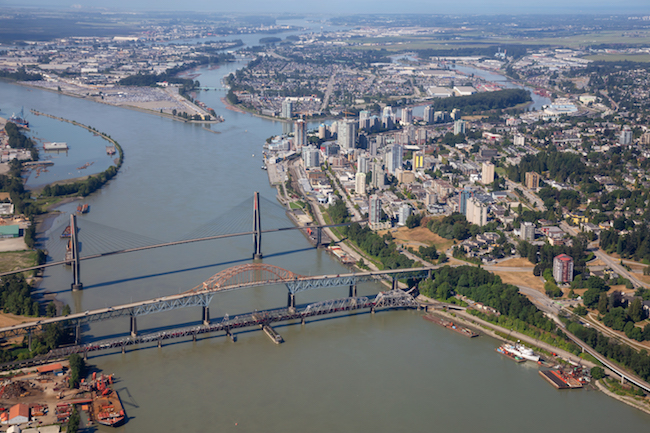
B.C. Supreme Court to hear construction groups’ challenge to province’s Community Benefits Agreement
By David Kennedy
Bridges Infrastructure Labour RoadsThe contentious labour rules have already been to put work on numerous big-ticket jobs, such as a major widening project on the Trans-Canada Highway and the new Pattullo Bridge

The CBA has already been put to use on numerous projects, including the major Pattullo Bridge replacement job. PHOTO: Getty Images
VANCOUVER—A year after the British Columbia government set out new hiring rules for some of the province’s largest infrastructure projects, a Vancouver judge has determined a court challenge to the so-called Community Benefits Agreement (CBA) can proceed in the province’s Supreme Court.
The Independent Contractors and Businesses Association (ICBA) and the Progressive Contractors Association of Canada (PCA), along with numerous other construction and business groups, began the legal challenge in court this February, while lawyers representing the government pushed to have the case referred to B.C.’s Labour Relations Board (LRB).
After weighing the arguments, Justice Christopher Giaschi determined the case will remain before the Supreme Court.
“The LRB does not have jurisdiction to determine whether the Minister properly exercised the statutory powers granted under the Transportation Act and does not have jurisdiction to grant the claims for relief in the nature of certiorari and prohibition,” he wrote in the July 23 judgement. “These are issues which only this Court has jurisdiction to address and which I have determined are not to be struck as the claims are not bound to fail.”
Giaschi did, however, strike down certain aspects of the construction groups’ court petition, citing the labour board’s jurisdiction.
Among other factors for keeping part of the challenge before the Supreme Court, Giaschi cited an “additional public element” involved, pointing to the size of the projects affected and “the allegation that the Building Trades Only Requirement is being imposed for an improper purpose, including, to benefit the supporters of the current government.”
“It is at least arguable that there is a sufficient public element making the impugned decision of the Minister to impose the Building Trades Only Requirement a matter of public law and therefore subject to judicial review,” he wrote.
The construction groups saw the decision as a clear victory.
“We’re now full-speed ahead on our legal challenge of this unfair, regressive, union-only monopoly,” Chris Gardner, ICBA president, said in a release. “We look forward to making our case against this sweetheart deal the NDP has handed their best supporters. The choice of which union to join, if any, should be made by the workers through a secret ballot, and should not be forced by government.”
Likewise, Paul de Jong, president of the PCA called the decision a major step forward.
“We’re delighted that our concerns have been taken seriously enough to be heard by the province’s highest court,” he said in a release. “Forcing 85 per cent of B.C.’s construction workforce to join a union of the government’s choice is not only unconstitutional, it’s just plain wrong.”
The province, on the other hand, pointed to the judge’s decision to refer certain aspects of the challenge to the LRB, including those invoking the Canadian Charter of Rights and Freedoms, as a positive outcome.
“We understand that the court decided that certain issues raised by the petitioners challenge are in the jurisdiction of the Labour Relations Board,” said Claire Trevena, the province’s minister of Transportation and Infrastructure in an emailed statement. “The province argued before the court that the LRB was the appropriate body to hear these issues. It will be the prerogative of the petitioner to decide whether they will pursue this further by way of an application with the Labour Relations Board.”
The CBA framework has been a major point of contention since it was introduced last year. It’s since been put to work on numerous public construction projects, including the new Pattullo Bridge and major roadwork along the Trans-Canada Highway. The government has already announced it will also be used for the $2.8 billion Broadway subway extension project, for which the province recently shortlisted three build teams.
While the labour rules do not strictly close the procurement process to non-union contractors, it requires workers that have been on the job for 30 days or more join one of 19 unions affiliated with B.C.’s Building Trades Unions. Critics claim this stipulation illegally shuts out non-union shops and leads to higher construction costs.
The B.C. government argues the CBA delivers numerous benefits to workers, including labour stability, better access to skills training and improved safety. The framework also aims to bolster underrepresented groups in the construction industry, setting out hiring practices for women and Indigenous people.
Trevena added the CBA will have “real and positive impacts” in local communities.
“We know that there’s a major skills shortage right now in B.C., a fact ignored by the previous government – and now we’re all paying for it,” she said. “That’s why Community Benefits ensures local workers are at the front of the line, that women and Indigenous workers get an opportunity that they might otherwise not, and that we’re training the next generation of workers.”




